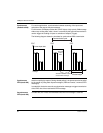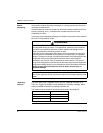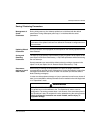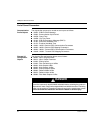
CANopen Network Interface
64
1606218 02 08/2006
Master
Monitoring
If the master requests "Guarding" messages on a strictly cyclical basis, the slave
can detect a master failure.
If the slave does not receive a request from the master within the defined "Life-Time"
interval ("Guarding" error), it considers that a master failure has occurred
("Watchdog" function).
In this case, the corresponding outputs go into fallback mode and the slave switches
back into "Pre-Operational" mode.
"Guarding"
Protocol
The initial value of the ''Toggle-Bit'' sent in the first ''Guarding'" message is ''0''.
Then, the ''Toggle'' bit changes in each subsequent ''Guarding'' message, which
makes it possible to indicate if a message has been lost.
The network state of the device is indicated in the seven remaining bits:
Note: Even if the monitoring function over time is disabled ("Guard-Time" and "Life-
Time-Factor" registers set to 0), the slave will respond to a remote request from the
master.
RISK OF UNINTENDED DEVICE OPERATION
An unexpected change in state to "Pre-Operational" mode may occur when the
slave does not successfully detect the master’s request even though a slave-
master communication monitoring protocol is used.
Depending on the configuration of the slave’s inputs and outputs, this change in
state may result in unintended device operation or in bodily injury or equipment
damage. The person in charge of configuring the system is fully responsible for the
configuration of the slave inputs/outputs and must ensure secure fallback
operations in the event of a loss of master/slave communication. The person in
charge of the configuration must also take all necessary steps to ensure equipment
and personnel safety should it prove impossible to secure the fallback operations.
Failure to follow this instruction can result in death, serious injury, or
equipment damage.
WARNING
Network state Response in hex.
Stopped 04H or 84H
Pre-operational 7FH or FFH
Operational 05H or 85H


















